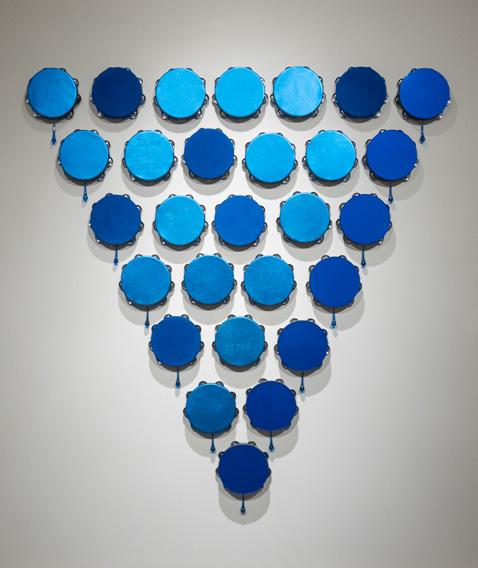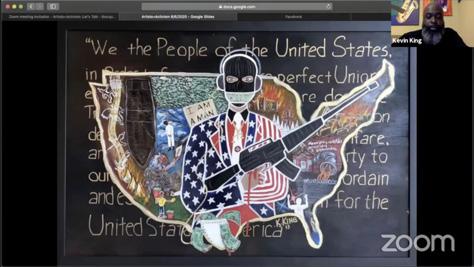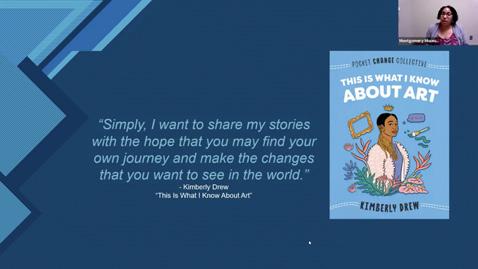
3 minute read
Social Justice in the Arts
The senseless and tragic murders of George Floyd, Ahmed Aubrey, Breonna Taylor, and other innocent African Americans that occurred in 2020 left our nation reeling. People took to the streets to demand justice and to voice opinions; they also looked to organizations to begin genuine institutional changes. Communities urged establishments to go beyond their solidarity statements, because a statement without transformative action is the same as complicity.
The MMFA staff were—and still are—very aware of the changes taking place within our social climate, both locally and nationally. We continue to survey the wider museum field to understand what role we might play as we believe in Lonnie Bunch’s sentiment that “...museums have a social justice role to play, that museums have an opportunity to...be at the center of their community, to help the community grapple with the challenges they face... to be a place that gives the public not just what it wants, but what it needs. And if that means that museums have to take a little more risk...then so be it” (for the complete quote, see pages 4–7).
Advertisement

Lava Thomas, A Change Is Gonna Come (Oh Yes It Will), 2018, tambourines, pyrographic calligraphy on metallic leather, suede, reflective plexiglass, grosgrain ribbon, and lampwork glass, Courtesy of Rena Bransten Gallery, San Francisco, CA. Personal to Political: Celebrating the African-American Artists of Paulson Fontaine Press was organized by Carrie Lederer, Curator of Exhibitions, Bedford Gallery, Lesher Center for the Arts, Walnut Creek, CA.
Based on our survey, the Museum decided two things: silence was not an option and action was necessary. But what did that mean and what would that look like? The immediate response was to prepare and disseminate a solidarity statement to ensure our community members that we stand with them. Yet, we knew that this action alone was not enough. We formed a team of staff members to contemplate the best course of action, utilizing our collection and our partnerships across the city to formulate a thoughtful way to move forward.
We embarked upon this social justice journey in June, and through September we offered several virtual programs that embraced our collective diversity, shed light on the struggles that many of our fellow community members face, and explored how art can help us heal as a community and as a nation. These offerings included Artists+Activism, Creative Conversations, Art of the Civil Rights Movement in Montgomery, Art+Letters, and Local Artists Live. MMFA staff worked crossdepartmentally to create an outdoor exhibition revealed in October of 2020, Voices of Change (see pages 10–11). All of these programs touched on societal issues through the lens of artists and helped frame (or reframe) the question that burns in everyone’s mind: how can we move forward together?

Artists+Activism: Let’s Talk hosted by MMFA educator Laura Bocquin and featuring Montgomery and River Region artists Madison Faile, Tori Jackson, Kevin King, Milton Madison, and Tara Sartorius Top Right: Local Artists Live presentation with Milton Madison
In addition to public-facing programs, we began working on internal initiatives to bring about systemic changes to the organization. Staff engaged in webinars, shared resources, and held discussions pertaining to social justice issues and the arts. Conversations were born as a result, revolving around the shortcomings and potential of the MMFA, and through these conversations it became undoubtedly clear that we, as an institution and as individuals, need to grow and evolve to better serve our community.
Therefore, the MMFA leadership formulated a DEAI (Diversity, Equity, Accessibility, and Inclusion) team consisting of members from senior management and staff to strategically address issues within our Museum. A grant that focuses on DEAI work has been submitted to the Institute of Museum and Library Services (IMLS) to fund large scale changes. In the meantime, the upcoming year will focus heavily upon the DEAI team working together to push forward initiatives that will help the institution become a welcoming and inclusive place. The MMFA staff remains steadfast in this work, and we are committed to the equitable treatment of all.

Art+Letters: This Is What I Know About Art with Cassandra Cavness









